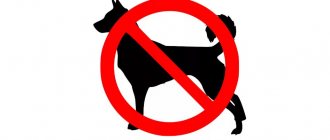Rules for keeping dogs: law
Usually, animal owners are adequate, but sometimes, due to either an insufficiently developed sense of responsibility, or because of excessive love for the same dogs, they forget about the basic rules of keeping and raising pets, thereby endangering others, and sometimes themselves.
It is for such cases that the idea arose to regulate how many dogs can be kept in an apartment by law and what the owners will face if they violate this rule. But so far the law does not limit the number of dogs. He avoids this issue altogether. However, if animals bother neighbors, and neighbors complain to the relevant authorities, then it is these authorities who decide how many dogs can be kept.
There are several other important rules regarding pet ownership. A complete list of them can be found in the draft law “On keeping dogs in the Russian Federation”
This law imposes certain obligations on the owner; you can receive an administrative fine for the death of an animal due to improper care, for cruel treatment of the animal, or for damage to someone else's property by the animal.
In this case, the owner is obliged not only to cover the damage caused, but also to pay an administrative fine.
The same law states that the corpses of pets are subject to mandatory burial or disposal. Simply throwing the body into the trash is prohibited.
Rules for living in a communal apartment
Neighbors have a pre-emptive right to purchase a share in a communal apartment. The seller is obliged to notify the other homeowners in writing of his intentions, describing in detail the terms of the proposed transaction. The neighbors have a month to buy out their share in the apartment. After this period, the seller can sell the property.
We recommend reading: Retail and wholesale based on
Hello! We rent 2 rooms in a communal apartment. We are 6 people (large family). Our older children eat in the kitchen at their table, but the neighbor doesn’t like the fact that the children are noisy in the morning (8 a.m.), don’t let her sleep, don’t like the fact that they walk along the corridor to do their needs and that they run around the corridor during the day. Are we breaking the law by having our children eat in the kitchen in the morning and throughout the day, or is this prohibited by law?
Dogs in an apartment building
Keeping a dog in an apartment is more difficult than in the private sector, because in an apartment building there is a greater chance of creating discomfort for others .
Due to this fact, more requirements are placed on owners:
- the owner’s responsibility to ensure that the pet does not pollute yards and public places;
- keeping a dog is strictly prohibited in a communal apartment, entrance, corridor and other places that belong not only to the owner;
- the pet should not be heard from 21:00 to 06:00;
- Walking dogs is only permitted with a muzzle and on a leash. The animal must also have a collar with a tag containing the owner’s contact information;
- Walking dogs is prohibited in crowded areas;
- Children under 14 years of age should not be sent to walk with dogs without adult supervision, as the child may not physically cope with the animal or simply become confused in a difficult situation.
Walk
When walking dogs you should be especially careful. Under no circumstances should you let your pet roam freely.
Firstly, such animals will be considered ownerless and subject to capture.
Secondly, the pet may run away, and finding it will not be easy.
Thirdly, a dog can attack a person or another domestic animal and inflict any injury on them, which will entail administrative or criminal liability for the owner.
And although the law clearly states that an animal can be walked strictly on a leash, wearing a muzzle and with a tag containing information about the owner, in practice this rule is very often neglected. As a result, there are a lot of lost animals, and attacks on people happen.
In addition, the owner is obliged to clean up the pet’s feces during a walk, although this is not common in our country and this rule has been reduced to cleaning up animal tracks left on the asphalt.
Keeping a loudly barking dog in an apartment, or a pet that spoils public green spaces near the house, shitting on lawns and asphalt, can sometimes lead to conflict with neighbors and even end up in court. Therefore, owners who decide to keep an animal in an apartment building should be attentive to any claims from others, and even to the behavior of their own pet, so as not to receive administrative liability for violating public order.
It is also worth noting that all dogs, starting from the age of three months, must be registered with the veterinary institutions at the place of residence. The purchased animal must be registered within a week.
In addition to what is listed, the bill specifies which breeds cannot be kept in an apartment. These include fighting, service, herding, hunting and guard breeds; they are considered potentially dangerous.
Responsibility of the animal owner for compliance with these rules
4.1. For failure to comply with these Temporary Rules, owners of dogs and cats are liable in accordance with the procedure established by law. 4.2. Harm caused to the health of citizens or damage to property caused by dogs and cats is compensated in accordance with the procedure established by law. 4.3. For cruel treatment of an animal or for an animal thrown into the street, the owner bears administrative responsibility if his actions cannot be regarded as malicious hooliganism and are not subject to criminal punishment in accordance with current legislation.
What the law says about keeping dogs in a private home
For people living in a private house, the rules are not so strict, since the house and surrounding area are the property of the owner, and he is free to dispose of it as he pleases. That is, by keeping a dog in the private sector, you don’t have to worry too much about what your neighbor thinks about it. But even here, particularly unscrupulous owners have a chance to receive an administrative fine, for example, if animals roam freely around the site and find a way to leave it.
By law, you can keep a dog on your personal property, allowing the animal to move freely around this area, but on the condition that the dog will not have the opportunity to go outside and its behavior will not cause trouble to others. By the way, in this case, at the entrance to the site it is necessary to hang a sign indicating the presence of a dog inside.
You can also keep dogs of potentially dangerous breeds in a private home, but to do this you will need to first obtain a license to purchase and keep such a pet. The owner of such a dog must also meet certain requirements, for example, learn at least the basics of training.
Veterinary and sanitary rules for keeping pets in St. Petersburg
VETERINARY AND SANITARY RULES FOR KEEPING PETS IN THE TERRITORY OF ST. PETERSBURGThe rules presented below were approved by the Chief Veterinary Inspector for St. Petersburg N.P. Batsanov January 15, 1998. Officially published in the “Bulletin of the Administration of St. Petersburg” No. 2/55 dated February 19, 1998.
1. “Rules for keeping pets on the territory of St. Petersburg” (hereinafter referred to as the “Rules”) were developed in accordance with the Law of the Russian Federation “On Veterinary Medicine”, sanitary and veterinary rules in the Russian Federation.
2. For the purpose of information support for the sanitary-epidemiological and veterinary-epizootic welfare of the population and wildlife in St. Petersburg, the State Veterinary Supervision authorities maintain a unified register of fauna in St. Petersburg by species and breeds with simultaneous registration in the surveillance and laboratory control network. The specified register contains data on all animals in St. Petersburg older than 3 months, indicating the address of their place of detention, or the habitat for stray animals. Registration in the surveillance and laboratory control network is carried out by the State Veterinary Supervision authorities simultaneously with the registration of animals.
3. Animal owners are required to submit animals for registration to bodies authorized by the Chief State Veterinary Inspector for St. Petersburg, and pay for entry into the register and issuance of documents. When changing the place of residence, the owner of the animal is obliged to inform about this so that appropriate changes can be made to the register.
4. All registered animals are assigned an identification number, which is retained throughout their life.
5. Simultaneously with registration, animals are vaccinated against rabies and for other epizootic indications.
6. A veterinary passport is also issued for dogs, cats and horses that have been registered.
7. Dogs and horses, cattle (as well as cats, at the request of their owners) are subject to annual re-registration.
8. Persons engaged in keeping and breeding domestic animals, or who have taken in ownerless animals, are obliged to provide them with conditions in accordance with zootechnical requirements for species and breeds and comply with veterinary and public safety requirements.
9. Premises used for keeping animals must comply with veterinary and sanitary requirements.
10. It is not allowed to keep or keep animals in the common areas of communal apartments if there are medical contraindications for any of the persons living in the apartment.
11. It is prohibited to keep agricultural productive livestock in residential premises, as well as to organize shelters and nurseries for any types of animals in them.
12. Owners are obliged to provide their animals with the necessary amount of food and water, walk them in accordance with the needs of the species and breed, and observe zoohygienic rules of keeping.
13. In case of illness or suspicion of illness of an animal with an infectious disease, the owner of the animal is obliged to immediately contact a veterinarian and strictly follow the recommendations of the specialist based on the examination results.
14. Animal owners are obliged to ensure that the animal behaves in such a way that it does not cause disturbance or pose a danger to others.
15. With the written permission of the authorized body of the State Veterinary Supervision, the keeping of zoo animals is permitted.
16. Dog owners who own or use a plot of land may keep their dogs free-ranging only in a well-fenced area or on a leash. A warning sign about the presence of a dog must be made at the entrance to the site.
17. The purchaser of an animal on the territory of St. Petersburg has the right to demand from the seller of the animal a veterinary certificate and other veterinary documents established by these rules.
18. Trade in animals is allowed only in places specially designated by the authorized body of the Administration of St. Petersburg. The authorized body of the Administration of St. Petersburg notifies the State Veterinary Supervision authorities about each case of providing a place for trade in animals on the territory of St. Petersburg. 19. Events involving a large number of animals (exhibitions, shows, competitions) are carried out with written permission from the State Veterinary Supervision Authority.
20. Moving, walking and transporting pets on all types of ground transport in St. Petersburg is permitted if there is an accompanying person over 14 years of age and a veterinary passport for the animal. In the subway it is possible to transport small animals in bags or other containers.
21. In public places and in transport, dogs accompanied by the owner may be on a leash. Without a leash, dogs may only be in permitted free-roaming areas.
For guard, large, fighting and aggressive animals, a muzzle is required even when free-ranging. The list of dogs by breed and other characteristics that are classified as large, guard, fighting and aggressive is approved by the Chief Veterinary Inspector of St. Petersburg.
22. Dogs of guard, fighting, large and aggressive breeds can be moved or walked only with a muzzle and with a separate escort for one or two individuals.
23. The movement and transportation of animals by persons in a state of intoxication is not permitted.
24. The movement of animals outside of St. Petersburg and to St. Petersburg is allowed only if there are permits from the State Veterinary Supervision Authority with a note on the vaccination of the animal no more than 12 months and no less than 30 days before entry or exit and no more 2 adults with one accompanying person.
25. It is prohibited to walk animals in places with prohibitory signs from the State Veterinary Supervision Authority, as well as on playgrounds, the territories of preschool and educational institutions, and hospitals.
26. In case of defecation of animals in entrances, on all asphalt and paved surfaces, playgrounds, on railway platforms and subways, during transportation of the animal by transport, the accompanying person evacuates the animal’s excrement to the nearest lawn or a container installed for these purposes.
27. During all movements of the animal, the owner is obliged to comply with safety rules, sanitary standards and veterinary requirements.
28. All stray animals in St. Petersburg are subject to capture and transfer under the supervision of Gosvetnadzor specialists in compliance with the requirements of the Civil Code of the Russian Federation on the treatment of stray animals.
29. If an animal dies, the owner is obliged to report this to the State Veterinary Supervision authorities in order to exclude the animal from the unified register, as well as the removal and cremation of the animal, which is carried out at the expense of the animal owner.
30. Only a licensed veterinarian can kill an animal for vital reasons. An exception to this rule is actions in emergency situations provided for by the legislation of the Russian Federation.
33. Persons guilty of violating these Rules are held accountable in accordance with the Law of the Russian Federation “On Veterinary Medicine”.
34. These Rules come into force on the date of their official publication.
table of contents | forward >>
Society for the Protection of Consumer Rights on Social Media:
Tweets from @ozpp_ru
Sanitary standards and how to comply with them
Regardless of whether you keep animals in an apartment or in a private house, you must comply with sanitary and hygienic standards.
The dog must be healthy and have all the vaccinations required by age (and especially the rabies vaccination, since this is a very dangerous disease for both animals and humans), and also periodically undergo veterinary control.
Where to complain if your neighbors dog is constantly barking?
If you are bothered by dog barking, then first of all you should talk to the owner, because he may not be at home at such moments, and therefore simply not in the know. If peaceful negotiations do not bring results, then you should contact the local police officer, who will conduct an explanatory conversation and may also issue a fine after several complaints. There are also higher authorities that are obliged to influence unscrupulous owners - Rospotrebnadzor and the regional administrative court.
Keeping animals in a communal apartment law
The decision is justified when the facts relevant to the case are confirmed by evidence examined by the court, satisfying the requirements of the law on their relevance and admissibility, or by circumstances that do not require proof (Articles 55, 59 - 61, 67 of the Code of Civil Procedure of the Russian Federation), and also when it contains exhaustive conclusions of the court arising from the established facts.
Based on Art. 328 of the Code of Civil Procedure of the Russian Federation, based on the results of consideration of an appeal or presentation, the appellate court has the right to cancel or change the decision of the first instance court in whole or in part and make a new decision in the case, if there are grounds provided for in Art. 330 Code of Civil Procedure of the Russian Federation.
Penalties and liability for violating the rules
For dishonest attitude towards the maintenance of his pet, the owner may incur disciplinary, administrative, civil and even criminal liability. ⇐
The type of liability can be determined by the court.
From all of the above, we can conclude that owning a dog is a big responsibility that must be accepted and fully understood. After all, this animal can pose a potential danger to others and even to its own owner. Therefore, in no case should you leave your pet unattended while walking, when he, one way or another, interacts with other creatures of the surrounding world. It is strictly forbidden to let even a small dog off a leash in crowded places.
What are the features of keeping animals in an apartment?
7) ensuring the safety of surrounding people and animals. Thus, appearing with a dog without a leash and muzzle in shops, institutions, playgrounds, markets, beaches and in transport is prohibited. In addition, drunk persons and children under 14 years of age are prohibited from walking dogs and appearing with them in public places and on transport;
The specifics of keeping animals in an apartment are not directly regulated by federal legislation. In any case, it is necessary to use the apartment for its intended purpose, maintain it in proper condition, respect the rights of neighbors, the rules for the use of residential premises and the maintenance of the common property of the owners of premises in an apartment building (Part 4 of Article 30 of the Housing Code of the Russian Federation).
Content Rules
There is a set of general rules for keeping pets in an apartment and apartment building, compliance with which is caused by the need to prevent all kinds of accidents and other incidents that are undesirable for society in general and specific people in particular.
- A pet must live on the territory of the person who tamed it and is responsible for it. It is prohibited to let the animal outside the apartment - for example, into the entrance hall, floor hall or premises, loggias and balconies for common use, onto the staircase, into the attic or into the ground floor, basements and underground passages. You cannot deprive an animal of its home and send it to the street - you must hand it over to a shelter. Or, if it is terminally ill, you have the right to go to a veterinary clinic where it will be euthanized.
- It is prohibited to intentionally cause any harm to pets. Even beatings during training are not an exception. The owner of a particular animal undertakes to provide proper care for it. Euthanasia of an animal is prohibited - with the exception, for example, of the last stage of cancer, which is difficult to treat.
- When an animal causes any harm to neighbors or passers-by, its owner will be held accountable. He will compensate for the loss and pay moral damages (by decision of the court or other competent authorities). If the victim is injured, resulting in serious harm, this is no longer administrative, but criminal liability.
- The owner must monitor the behavior of his pet. In particular, he must not use, for example, a fighting dog as a means of threats or blackmail. If the same animal attacks, the owner will be held accountable by law.
- An animal’s behavior is an indicator of its owner’s care for it. Thus, the dog should not move around the territory of a sports or playground without a muzzle, or travel with the owner on public transport.
- A pet should not relieve itself at bus stops, on school premises, in hospitals, etc. If this does happen, the owner must immediately clean up after the pet.
- If signs of aggressive behavior or danger to neighbors and passers-by are detected, the owner is obliged to isolate the animal from other people by contacting a veterinary clinic. In the event of the death of the same animal, the owner must quickly and correctly resolve the issue of its burial, and not use a general garbage dump for this. It is prohibited to bury a dead animal in the ground in the courtyards of residential areas and apartment buildings. There have been cases when animals infected with rabies were burned, but similar types of cases should also be dealt with by the appropriate service.
- It is prohibited to breed dogs and cats of special breeds for meat or fur.
- It is also not permitted to breed or purchase fighting dogs to participate in dog fighting.
- Animals should not be left unattended in a closed room or car for more than an hour.
An apartment (own or temporary) should be used only for human habitation, and not for arranging or maintaining a nursery or holding point, or animal shelter. Otherwise, the owner of the apartment must part with the animals or move out of the given living space. The same requirements apply to communal apartments, dormitories and the private sector. Inappropriate use of any residential space goes against the Housing Code of the Russian Federation and sanitary standards.
In case of malicious, periodic violation of the norms, the owner or guardian of pets is held administratively liable.









